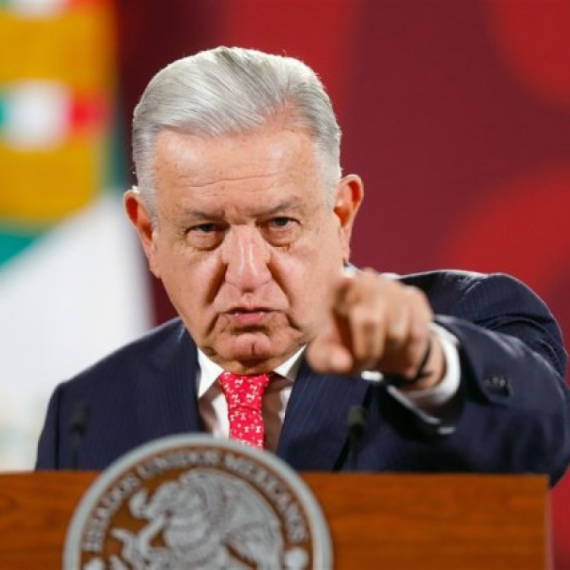U.S. analysts examine Serbia's post-election woes
Daniel Serwer says that Serbia is faced with a difficult period of government formation in the wake of the May 11 elections.
Tuesday, 20.05.2008.
21:27

Daniel Serwer says that Serbia is faced with a difficult period of government formation in the wake of the May 11 elections. But the vice president at the United States Institute of Peace told Tanjug news agency in an interview that he was hopeful the process would be completed shortly with the creation of a coalition which would be headed by the Democratic Party (DS). U.S. analysts examine Serbia's post-election woes “A DS-based government is the best scenario for Serbia's prospects for entering the EU, which in my view is the best outcome. Continuation in power of the forced marriage between DS and DSS would likely be the worst outcome, since it holds Serbia back from its European future and leaves the country without a serious democratic alternative,” Serwer said. He added that a “Radical-based government would not make him happy”, which, as he put it, "seems to be a possibility". Serwer holds that the United States should be willing to cooperate with any government in Belgrade that met reasonable international community requirements. “The first of these is turning Ratko Mladic over to The Hague,” he said, pointing out that the “EU and the U.S. need to stick with it now.” Serwer added that the fact that the key to the future government in Belgrade is in the hands of the Socialist Party of Serbia (SPS) "proves that sometimes, democracy has strange outcomes.” “I don't know the Socialists well, but they have a historic responsibility and opportunity. They can either turn Serbia toward a bright future in the EU, or throw Serbia into the arms of the Russians,” the U.S. analyst said. “I think it is clear what most Serbs prefer, so I hope that the Socialists will choose Brussels over Moscow,” he concluded. Unlike analysts such as Martin Sletzinger and some others, Serwer believes that the U.S. policy on Kosovo has contributed to a stabilization of the Balkans, since, as he put it, the situation in Kosovo, "especially for the Kosovo Serbs, would have been much worse" had his country not "moved ahead with Kosovo independence". “But that does not mean things are good: the current government in Belgrade is forcing a de facto partition on Kosovo that will sooner or later lead to challenges to stability, not only in Kosovo but also in southern Serbia,” he said, adding that “this is what Prime Minister Kostunica wants.” According to Serwer, who, Tanjug notes, "has been advocating Kosovo independence for years", Serbia, in the long run, will not be able to enter the EU without directly or indirectly acknowledging Kosovo's independence. “In my view, Kosovo's entry into the UN should be a condition for Serbia's entry into the EU. It is time for the EU and the U.S. to tell any government in Serbia that that will be required,” he said. "U.S. part, rather than solution for Kosovo" Director of East European Studies at the Washington Woodrow Wilson Center Martin Sletzinger assessed on Monday that the United States are ready to cooperate with any government in Belgrade which would not cause fresh destabilization of the region. “I think that the U.S. would be willing and able to cooperate with any government in Serbia which endorses movement towards the EU and can live with the realities of Kosovo and Bosnia and not threaten or engage in violent actions,” Sletzinger said in an interview with Tanjug. However, the United States, which, as he pointed out, “has been part rather than the solution” for the Kosovo issue, would prefer, just like most of the EU countries, to deal with the coalition gathered around Democratic Party (DS) leader Boris Tadic, but would not rule out cooperating with the Serb Radical Party (SRS) either, as long as the Radicals took no steps to destabilize the region. Asked if he believed that the U.S. policy on Kosovo had contributed to a stabilization of the Balkans, which was said to have been its goal, he answered that in the diplomatic sense, the United States had been and still were “a part of the problem, rather than the solution.” “The disingenuous U.S. policy towards Kosovo and its independence all along helped to scuttle the Ahtisaari plan, helped to bring the Russians firmly into the process on the side of the Serbia and has in general contributed to tensions between Serbs and Kosovars,” Sletzinger was quoted as saying.
U.S. analysts examine Serbia's post-election woes
“A DS-based government is the best scenario for Serbia's prospects for entering the EU, which in my view is the best outcome. Continuation in power of the forced marriage between DS and DSS would likely be the worst outcome, since it holds Serbia back from its European future and leaves the country without a serious democratic alternative,” Serwer said.He added that a “Radical-based government would not make him happy”, which, as he put it, "seems to be a possibility".
Serwer holds that the United States should be willing to cooperate with any government in Belgrade that met reasonable international community requirements.
“The first of these is turning Ratko Mladić over to The Hague,” he said, pointing out that the “EU and the U.S. need to stick with it now.”
Serwer added that the fact that the key to the future government in Belgrade is in the hands of the Socialist Party of Serbia (SPS) "proves that sometimes, democracy has strange outcomes.”
“I don't know the Socialists well, but they have a historic responsibility and opportunity. They can either turn Serbia toward a bright future in the EU, or throw Serbia into the arms of the Russians,” the U.S. analyst said.
“I think it is clear what most Serbs prefer, so I hope that the Socialists will choose Brussels over Moscow,” he concluded.
Unlike analysts such as Martin Sletzinger and some others, Serwer believes that the U.S. policy on Kosovo has contributed to a stabilization of the Balkans, since, as he put it, the situation in Kosovo, "especially for the Kosovo Serbs, would have been much worse" had his country not "moved ahead with Kosovo independence".
“But that does not mean things are good: the current government in Belgrade is forcing a de facto partition on Kosovo that will sooner or later lead to challenges to stability, not only in Kosovo but also in southern Serbia,” he said, adding that “this is what Prime Minister Koštunica wants.”
According to Serwer, who, Tanjug notes, "has been advocating Kosovo independence for years", Serbia, in the long run, will not be able to enter the EU without directly or indirectly acknowledging Kosovo's independence.
“In my view, Kosovo's entry into the UN should be a condition for Serbia's entry into the EU. It is time for the EU and the U.S. to tell any government in Serbia that that will be required,” he said.
"U.S. part, rather than solution for Kosovo"
Director of East European Studies at the Washington Woodrow Wilson Center Martin Sletzinger assessed on Monday that the United States are ready to cooperate with any government in Belgrade which would not cause fresh destabilization of the region.“I think that the U.S. would be willing and able to cooperate with any government in Serbia which endorses movement towards the EU and can live with the realities of Kosovo and Bosnia and not threaten or engage in violent actions,” Sletzinger said in an interview with Tanjug.
However, the United States, which, as he pointed out, “has been part rather than the solution” for the Kosovo issue, would prefer, just like most of the EU countries, to deal with the coalition gathered around Democratic Party (DS) leader Boris Tadić, but would not rule out cooperating with the Serb Radical Party (SRS) either, as long as the Radicals took no steps to destabilize the region.
Asked if he believed that the U.S. policy on Kosovo had contributed to a stabilization of the Balkans, which was said to have been its goal, he answered that in the diplomatic sense, the United States had been and still were “a part of the problem, rather than the solution.”
“The disingenuous U.S. policy towards Kosovo and its independence all along helped to scuttle the Ahtisaari plan, helped to bring the Russians firmly into the process on the side of the Serbia and has in general contributed to tensions between Serbs and Kosovars,” Sletzinger was quoted as saying.


























































Komentari 5
Pogledaj komentare